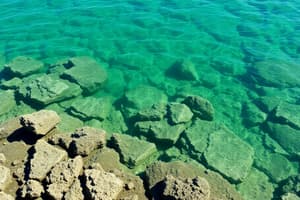Podcast
Questions and Answers
What is the primary composition of the Canadian Shield?
What is the primary composition of the Canadian Shield?
- Highly metamorphosed granite (correct)
- Basaltic rocks
- Sedimentary rocks
- Volcanic ash
Which geological process contributed to the formation of the Canadian Shield?
Which geological process contributed to the formation of the Canadian Shield?
- Uplift mountain building (correct)
- Tectonic plate subduction
- Volcanic eruptions
- Sediment deposition
Which region of the Canadian Shield has copper, gold, iron, and silver deposits?
Which region of the Canadian Shield has copper, gold, iron, and silver deposits?
- Slave Province
- Grenville Province
- Superior Province (correct)
- Bear Province
Which province within the Canadian Shield is known for its nickel and copper deposits?
Which province within the Canadian Shield is known for its nickel and copper deposits?
What is the age range of the rocks that make up the Canadian Shield?
What is the age range of the rocks that make up the Canadian Shield?
What is the primary geological composition of the Canadian Shield?
What is the primary geological composition of the Canadian Shield?
Which province within the Canadian Shield is known for its copper, gold, iron, and silver deposits?
Which province within the Canadian Shield is known for its copper, gold, iron, and silver deposits?
Which region of the Canadian Shield is known for its copper and uranium deposits?
Which region of the Canadian Shield is known for its copper and uranium deposits?
In which part of Canada does the Canadian Shield cover approximately 50 per cent of the land mass?
In which part of Canada does the Canadian Shield cover approximately 50 per cent of the land mass?
What aspect of the physical landscape of the Canadian Shield is primarily a result of erosion and glaciers?
What aspect of the physical landscape of the Canadian Shield is primarily a result of erosion and glaciers?
Which traditional territory includes what is now Quebec and Labrador within the Canadian Shield?
Which traditional territory includes what is now Quebec and Labrador within the Canadian Shield?
What type of resources have been historically yielded by the Canadian Shield?
What type of resources have been historically yielded by the Canadian Shield?
Which geological process has contributed to the long history of uplift, mountain building, and erosion in the Canadian Shield?
Which geological process has contributed to the long history of uplift, mountain building, and erosion in the Canadian Shield?
Which geological formation covers a vast area of North America?
Which geological formation covers a vast area of North America?
Flashcards are hidden until you start studying
Study Notes
The Canadian Shield: A Geological Overview
The Canadian Shield is the exposed portion of the continental crust underlying the majority of North America, extending from northern Mexico to Greenland and consisting of hard rocks at least 1 billion years old. It covers an area of over 8 million square kilometers, making up roughly 50% of Canada's landmass. The Shield is composed mainly of highly metamorphosed granite, with smaller areas of other rock types. It is the largest mass of exposed Precambrian rock on Earth.
Key Features
-
Age and Formation: The Canadian Shield is composed of ancient rocks, some of which are more than four billion years old. It is the result of a long history of uplift mountain building (orogeny) and erosion.
-
Geological Regions: The Shield has been divided into seven different regions or provinces by geologists, including Nain, Grenville, Southern, Superior, Churchill, Slave, and Bear. Each region has its own unique geological characteristics and natural resources.
-
Natural Resources: The Canadian Shield is home to a variety of natural resources, including minerals, coniferous forests, and the potential for hydroelectric developments. The Southern Province, for example, is known for its nickel and copper deposits, while the Superior Province has copper, gold, iron, and silver.
-
Glacial History: During the Pleistocene Epoch (2.6 million to 11,700 years ago), the Canadian Shield was covered by vast continental glaciers. The ice melted and deposited rocky, ice-smoothed hills and irregular basins, which are now filled by lakes or swamps.
Human Impact
The Canadian Shield has been home to Indigenous peoples for thousands of years, including the Innu, Cree, Anishinaabeg, and Métis. European settlers began exploring and colonizing the region in the 17th and 18th centuries, with beavers found in the Shield region becoming a valuable source for the fur trade. Today, the Canadian Shield continues to support various industries, including mining, forestry, and hydroelectric power production.
Studying That Suits You
Use AI to generate personalized quizzes and flashcards to suit your learning preferences.




